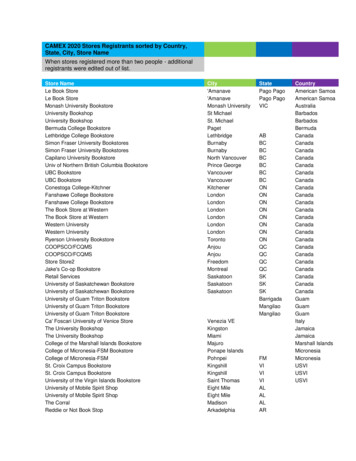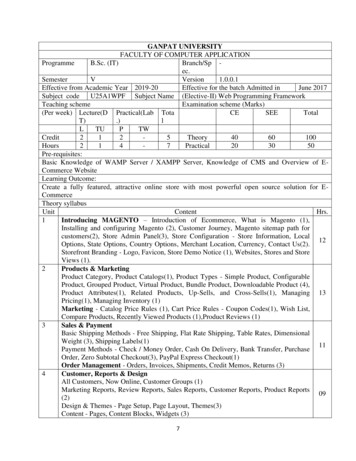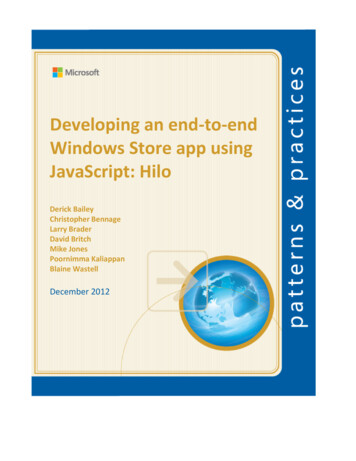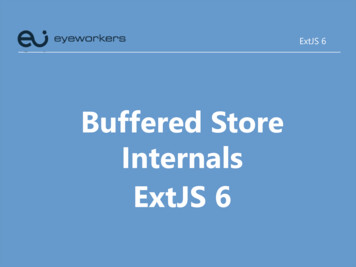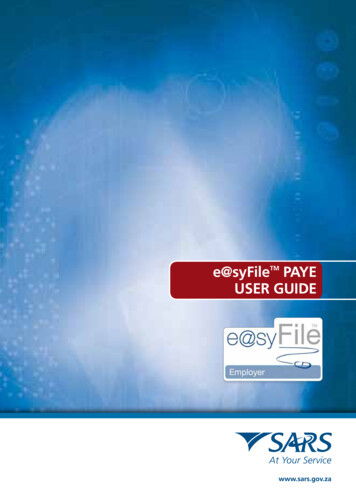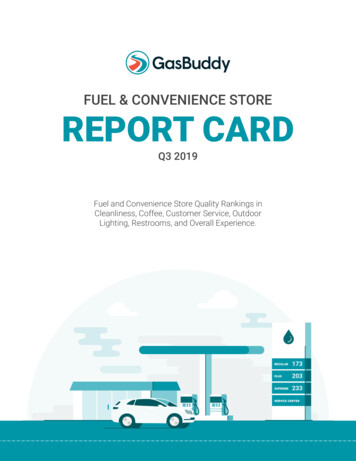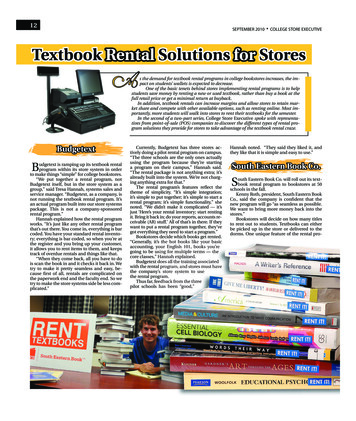
Transcription
12SEPTEMBER 2010 COLLEGE STORE EXECUTIVETextbook Rental Solutions for Storess the demand for textbook rental programs in college bookstores increases, the impact on students’ wallets is expected to decrease.One of the basic tenets behind stores implementing rental programs is to helpstudents save money by renting a new or used textbook, rather than buy a book at thefull retail price or get a minimal return at buyback.In addition, textbook rentals can increase margins and allow stores to retain market share and compete with other available options, such as renting online. Most importantly, more students will walk into stores to rent their textbooks for the semester.In the second of a two-part series, College Store Executive spoke with representatives from point-of-sale (POS) companies to discover the different types of rental program solutions they provide for stores to take advantage of the textbook rental craze.BudgetextBudgetext is ramping up its textbook rentalprogram within its store system in orderto make things “simple” for college bookstores.“We put together a rental program, notBudgetext itself, but in the store system as agroup,” said Tresa Hannah, systems sales andservice manager. “Budgetext, as a company, isnot running the textbook rental program. It’san actual program built into our store systemspackage. This is not a company-sponsoredrental program.”Hannah explained how the rental programworks. “It’s just like any other rental programthat’s out there. You come in, everything is barcoded. You have your standard rental inventory; everything is bar coded, so when you’re atthe register and you bring up your customer,it allows you to rent items to them, and keepstrack of overdue rentals and things like that.“When they come back, all you have to dois scan the book in and it checks it back in. Wetry to make it pretty seamless and easy, because first of all, rentals are complicated onthe paperwork end and the faculty end. So wetry to make the store systems side be less complicated.”CSE012, 014 015.indd 12Currently, Budgetext has three stores actively doing a pilot rental program on campus.“The three schools are the only ones actuallyusing the program because they’re startinga program on their campus,” Hannah said.“The rental package is not anything extra; it’salready built into the system. We’re not charging anything extra for that.”The rental program’s features reflect thetheme of simplicity. “It’s simple integration;it’s simple to put together; it’s simple to start arental program; it’s simple functionality,” shenoted. “We didn’t make it complicated — it’sjust ‘Here’s your rental inventory; start rentingit. Bring it back in; do your reports, accounts receivable (AR) stuff.’ All of that’s in there. If theywant to put a rental program together, they’vegot everything they need to start a program.”Bookstores decide which books get rented.“Generally, it’s the hot books like your basicaccounting, your English 101, books you’regoing to be using for multiple terms — thecore classes,” Hannah explained.Budgetext does all the training associatedwith the rental program, and stores must havethe company’s store system to usethe rental program.Thus far, feedback from the threepilot schools has been “good,”Hannah noted. “They said they liked it, andthey like that it is simple and easy to use.”South Eastern Book Co.South Eastern Book Co. will roll out its textbook rental program to bookstores at 50schools in the fall.Kenny Roth, president, South Eastern BookCo., said the company is confident that thenew program will go “as seamless as possible.We want to bring more money back into thestores.”Bookstores will decide on how many titlesto rent out to students. Textbooks can eitherbe picked up in the store or delivered to thedorms. One unique feature of the rental pro-8/3/10 4:37 PM
CSE0810 Budgetext.indd 16/7/10 10:32 AM
14SEPTEMBER 2010gram is that South Eastern Book Co. will provide customized packing slips with the bookstore logo to make it easier for students toknow where the books should be returned.The Logi-Text point-of-sale (POS) system,powered by South Eastern Book, features atextbook rental option so bookstore personnelcan track the titles rented out, and make surethat inventory is always available for students.Roth noted that renting textbooks will savestudents an average of 65-75 percent, as opposed to buying them. “It’s a win-win for allparties,” he said. “Renting is taking traction inthe bookstore industry. It saves students money, and at the same does not ruin the bookstore’s relationship with students.”A pilot rental program was instituted in thespring at four schools, with very positive feedback, Roth said.“It’s another way we can serve our customers,” he added, “and we want to truly be awholesale college book company. We want tofind our niche with our customers in how wecan serve them.”MBS TextbookExchange, Inc.MPHOTO COURTESY OF FOLLETT HIGHER EDUCATION GROUP)BS Textbook Exchange, Inc. recentlyintroduced a solution for college bookstores looking to jump into the textbook rentalcraze with the launch of MBS Rental.The MBS Rental program kicked off atthe Campus Market Expo (CAMEX) in Marchin Orlando, Fla., and thus far, more than 500member stores have signed on in advance ofthe official launch in the 2010 fall semester.“The reason we came up with the programis that rental is the hottest topic we have rightnow in our industry,” said Lil Howard, MBScorporate marketing representative. “That iswhat the students want, so how can we helpstores get into that rental market?”CSE012, 014 015.indd 14Howard explained that stores face two major obstacles in their quest to start a textbookrental program.“Typically, for a store to have a rental program at all, there are two main things that stopthem from doing that — the first one typicallyis the capital expenditure up front of having tobuy all the books. Then you’re renting them ata very low price, and you’re renting them againtwo and three terms at a time before you reallystart to see any return on investment. That’shard for stores.“Also, getting the faculty to commit to abook that long can be problematic.”With bookstores facing these challenges,MBS came up with a program where the twoobstacles were eliminated. As a result, storescan now get into the rental market and be ableto compete with online rental companies.“The nice thing about the program is thatwe don’t have a lot of restrictions for stores,”she said. “We wanted them to be able to havetheir own rental program. We’re just givingthem the tools they need to make it happen.Each store is able to manage the programcompletely how they see fit.”Books available for rental are determinedmutually between MBS and its customers,and customers can set their own prices onrental books. MBS pays a premium of up to 46percent for the new shelf price for the booksdesignated for rental in each participatingstore. Textbooks can be acquired from anyand all sources, and stores do not have to buythe books they offer for rental from MBS.MBS Rental offers several benefits for storesand students. “I think the biggest advantagefor stores is that students will be able to usetheir financial aid as a tender within the store,”she explained. “They’re not able to do thatwhen they go online; they’re not able to usetheir financial aid. By renting from their store,students know they have the right book.“I think students are only going to inconvenience themselves to go online so much. Ifthey know their local storehas a rental program wherethey can go and rent theircollege books, I think they’reabsolutely going to go to thatstore, as compared to goingonline and having to pay ashipping fee and then havingto ship the books back.”Another advantage forstudents is that they havemore leeway in terms ofhighlighting and writing inthe books they rent.“We’re in the book business; we’ll do anything wecan do to help our customerssucceed,” Howard said. “Ifthe stores succeed, we succeed. If we can keep themgoing, and help them get intothese rental markets, as longas we’re keeping the store relevant, we stay relevant.” COLLEGE STORE EXECUTIVEA store can use the MBS point-of-sale(POS) system to help manage its rental program, but it is not a requirement. “A store doesnot have to be on our system in order to takeadvantage of the rental program itself,” shenoted. “The rental program is for the store tomanage. We’re just providing what the storesneed to have a rental program.“Howard said that bookstore managers arereally excited about signing up for MBS Rental.“They’re excited to have the opportunity to offer rental to their students because they wantto be able to do this as much as we want tohelp them. They want to be able to have thatlower price for the students too. It’s a prettysimple process.“This is what the students want. They wantthat rental price; they want to be able to renttheir books. This is something the bookstoresare now going to be able to provide for them. Ithink it’s absolutely going to take off. It’s goingto be great PR on many different levels for thebookstore.”One of the main objectives of the rentalprogram is to increase foot traffic in bookstores. “If they’re coming in the store to rentthe book, they’re going to come back in thestore again to return it,” Howard pointed out.“That was one of the key reasons we wanted tocome up with something to help stores. Howcan we get the students back in their stores?”Sequoia Retail SystemsJim Zaorski, CEO, Sequoia Retail Systems,notices the trend by new companies andestablished wholesalers to rent books as achallenge to bookstores.“If stores do not offer a rental solution, theywill abandon this business, losing profits andcustomer loyalty,” he noted.Zaorski added that book rentals will makefewer used books available at buyback, sostores may no longer be able to rely on theirwholesalers to get them the used books theyneed.“It is foreseeable that wholesalers may nothave access to the same quantity of books,and what books they get they may need fortheir own rental programs, thus limiting whatstores should expect,” he explained. “We thinkstores will not only need to adopt a rental8/3/10 4:37 PM
CSE0910 NebraskaBook.indd 17/23/10 2:36 PM
COLLEGE STORE EXECUTIVE 15SEPTEMBER 2010program, but will also need to get creative tofind used stock for these programs in order tomake these programs successful.”In order to meet the challenge, Sequoiareleased a new textbook rental module andleveraged its existing e-commerce, wirelessand textbook management software modulesto help its customers obtain the used booksneeded to start a program.Zaorski noted that having a good rentaltracking program may not be enough if a storedoes not have enough used books to rent. “Ifa store has to buy all new books to start a program, it will lose money on the program in thefirst year,” he said. “In today’s tight budget climate, this is unacceptable. Starting with usedbooks, the payback period is much quickerand a rental program can get off the groundwith a lot less investment and subsequentlygrow much faster.”To increase the number ofused books available for buyback,“Our customers are using ourcascade ordering, which allowsthem to run want lists throughall wholesalers; our multi-guidebuyback, which compares pricesamong wholesalers at buybackand gives the student the highestprice; and our wireless partnerproduct, which gives real-timebuying capability at remote sitesaround the campus. They are alsoposting real-time buyback priceson their ePOS websites to promote traffic, and using our Bookshare product to exchange unneeded texts with other schools.”Ideas planned for the nextrelease of Bookshare include incorporating text messages forstudents to return textbooks, andallowing stores to provide onlinerentals.ule; SmartPOS, the point-of-sale (POS) module; and SmartGM, the general merchandisemodule.“It provides real-time information and allows the student to rent a book, vs. purchasingit,” he explained. “The upfront cost is greatlyreduced by renting.”SmartRental offers full reporting features,and stores can keep track of customer information by tying into the company’s customerloyalty database. It will send out automated emails for reminders on books that are comingdue, as well as past due notices. If a studentdoes not return a book, the system will chargethe card he/she used for the deposit.The list of titles available for rental is determined by the bookstore and prices are also setby the store.“The benefit of SmartRental is it will allowthe store to compete even greater with the ever-increasing Internet market,” Winters noted.“It will allow students to get their textbooks fora lower upfront cash outlay. For stores, it willhelp bring in new customers and keep existing customers shopping in their stores.“The benefit to us is it increases interest inthe rest of our system, but it’s something ourcustomers have demanded for about a year.We’re just keeping up with the latest trendsand technology.”A number of schools have SmartRental inplace now and are just starting to use it. Feedback at the schools that beta-tested SmartRental during the 2009 fall semester was “verypositive,” Winters said. “It worked really well.”—CSETotal ComputingSolutionsTotal Computing Solutionsoffers a textbook rental module called SmartRental for storesto compete with other textbookbuying opportunities available,including the Internet.SmartRental had been betatested since November 2009,and was officially introduced inMarch at the Campus MarketExpo (CAMEX) in Orlando, Fla.Senior Account ExecutiveSteve Winters explained thatSmartRental allows students torent textbooks, as well as general merchandise. It is tied intothe company’s other SmartSuitemodules, including SmartText,the textbook management mod-CSE012, 014 015.indd 158/3/10 4:37 PM
CSE0810 PureOrange.indd 15/21/10 5:01 PM
group," said Tresa Hannah, systems sales and service manager. "Budgetext, as a company, is not running the textbook rental program. It's an actual program built into our store systems package. This is not a company-sponsored rental program." Hannah explained how the rental program works. "It's just like any other rental program

